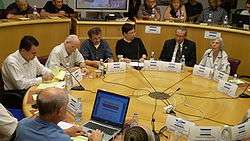Israel Democracy Institute

The Israel Democracy Institute (IDI, Hebrew: המכון הישראלי לדמוקרטיה), established in 1991, is an independent, nonpartisan, nonprofit think tank in Jerusalem, Israel.[1] It goals are to formulate policies and initiate reforms to strengthen democratic values in Israel.
History and goals
The Israel Democracy Institute was founded in 1991 by Arye Carmon, the founding president, and Mr. Bernard Marcus. Eytan Avriel of Haaretz says it is funded "from donations, mostly from mostly from a wealthy American-Jewish donor, Bernard Marcus, one of the founders of retailer Home Depot.[2]In 2014, former MK Yohanan Plesner was named President of the Institute, replacing Dr. Carmon, who sought to focus on research after 22 years of heading the Institute.
On the seam line between academia and government, IDI is a forum for research, debate and reform of Israeli democratic institutions and is a leading nongovernmental agent of change in the Israeli body politic. Its mission is to strengthen the moral, normative, structural and functional foundations of Israel, the homeland of the Jewish people. Recognizing the Arab and other minorities as vital components of Israeli society, IDI aims to foster solidarity while embracing pluralism. Drawing on both Jewish tradition and the universal legacy of humanism, it seeks to generate the ideas, promote the values, and shape the institutions that will ensure Israel's future as a vibrant, participatory democracy.
IDI's primary areas of concern are structural reforms, democratic values, and identity and solidarity. Its projects focus on political reforms, reforms in the executive branch, reforms in the Judiciary, reforms in the media, constitutional principles, national security and democracy, human rights and Judaism, democracy in crisis, religion and state, the Nation State, Arab-Jewish relations, and the integration of the Ultra-Orthodox in Israeli society.
IDI's Guttman Center for Surveys [3] conducts research on public opinion in Israel and publishes the annual Israeli Democracy Index [4] and monthly Peace Index, [5] an ongoing survey of attitudes towards the Israel-Arab conflict which became a joint program of IDI and Tel Aviv University in January 2010. IDI hosts the annual Eli Hurvitz Conference on Economy and Society (formerly the Caesarea Forum for Economic Policy),[6] roundtable discussions, and a variety of conferences and public events. IDI is also responsible for the Constitution by Consensus [7] project and has drafted a proposal for the Constitution of the State of Israel.
The Seventh Eye website,[8] which serves as a forum for discussion of media affairs and journalistic self-criticism, is an additional project of the Institute.
The institute is nonpartisan and generally liberal.[9][10]
Leadership
IDI is headed by former MK Yohanan Plesner. Its leadership includes two Vice Presidents of Research: Prof. Mordechai Kremnitzer, Professor Emeritus of International Law at Hebrew University, and Prof. Yedidia Stern, a Professor of Law at Bar-Ilan University and former dean of its law school. Senior Research Fellows of the Institute include Admiral Ami (Amichay) Ayalon, Professors Hanoch Dagan, Momi Dahan, Yuval Feldman, Tamar Hermann, Shahar Lifshitz, Yotam Margalit, Gideon Rahat, Eli Shaltiel, and Yuval Shany, and Mr. Doron H. Cohen. Past Senior Fellows include Prof. Avi Ben Bassat, Prof. Ruth Gavison, Adv. Dan Meridor, Prof. David Nachmias, Prof. Eyal Naveh, Prof. Aviezer Ravitzky, and Prof. Anita Shapira. The late Prof. Asher Arian headed the Institute's program on political reform and directed its Guttman Center for Applied Social Research. In 2013, Dan Landau replaced Rabbi Itshak Levi as head of IDI's Policy Implementation division. Former U.S. Secretary of State George P. Shultz serves as the Chairman of the Institute's International Advisory Council. Mr. Amir Elstein is the Chairman of the Board. Rabbi Dr. Benjamin (Benny) Lau heads the Institute's Human Rights and Judaism in Action project, which has published several contemporary responsa on people with disabilities and Jewish law.[11] [12]
Constitution by Consensus
In 2001 the institute established a public council led by Meir Shamgar in order to consolidate an Israeli constitution which would be agreed upon by all the current currents in Israel. The public council included ninety people from the academy, politics, religion and more which come from a variety different currents and opinions.
Additional activities
The Guttmann Center run by the Israeli Democracy Institute was established in 1947 to conduct public opinion polls and studies social indexes. It publishes the annual Israeli Democracy Index and the monthly Peace Index. The Index of Arab-Jewish Relations[13] became a project of the Institute and the University of Haifa in 2013.
Since 1993 the Israeli Democracy Institute has conducted an economic convention which discusses the different aspects of the Israeli economy. Originally entitled the Caesarea Economic Policy Planning Forum, this conference is now called the Eli Hurvitz Conference on Economy and Society.
Publications
IDI Press publishes a wide range of books and policy papers in both Hebrew and English. Its annual Israeli Democracy Index is published in both Hebrew and English each year. It also publishes an English version of the Hebrew journal Democratic Culture in Israel and the World[14] in cooperation with Bar-Ilan University. It also publishes the online journal HaAyin HaShevi'it ("The 7th eye").[15]
Awards and recognition
In 2009, IDI was awarded the Israel Prize for its "lifetime achievement and special contribution to society and the State of Israel.[16][17]
In the University of Pennsylvania's 2014 Global Go To Think Tanks Report, IDI was ranked the twenty-third best think thank in the Middle East and North Africa.[18]
See also
References
- ↑ http://www.idi.org.il/sites/english/AboutIDI/Pages/HistoryandMission.aspx
- ↑ How Israel profits from the nonprofits Haaretz, 28 April 2015
- ↑ http://en.idi.org.il/tools-and-data/guttman-center-for-surveys/about-the-guttman-center
- ↑ http://en.idi.org.il/tools-and-data/guttman-center-for-surveys/the-israeli-democracy-index
- ↑ http://en.idi.org.il/tools-and-data/guttman-center-for-surveys/the-peace-index
- ↑ http://en.idi.org.il/events/eli-hurvitz-conference
- ↑ http://en.idi.org.il/projects/constitution-and-democratic-principles/constitution-by-consensus
- ↑ http://en.idi.org.il/projects/israeli-society/the-seventh-eye-journal
- ↑
- ↑
- ↑ Access of People with Guide Dogs to the Western Wall Prayer Plaza
- ↑ Marriage in Sign Language
- ↑ http://en.idi.org.il/analysis/idi-press/publications/english-books/still-playing-by-the-rules-the-index-of-arab-jewish-relations-in-israel-2012-english
- ↑ http://en.idi.org.il/analysis/idi-press/publications/english-books/democratic-culture-in-israel-xiv
- ↑ Seventh Eye
- ↑ "Israel Prize Official Site (in Hebrew) - Recipient's Background.".
- ↑ "Israel Prize Official Site (in Hebrew) - Judges' Rationale for Grant to Recipient".
- ↑ "The 2014 Global Go To Think Tank Index". University of Pennsylvania. 2015-02-04. Retrieved 2015-02-14.